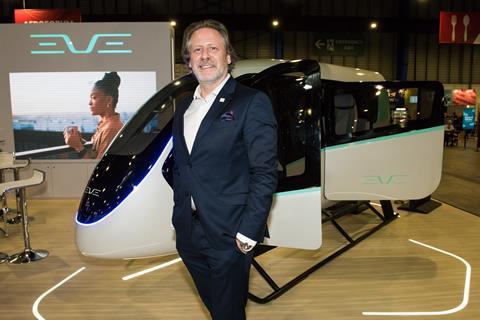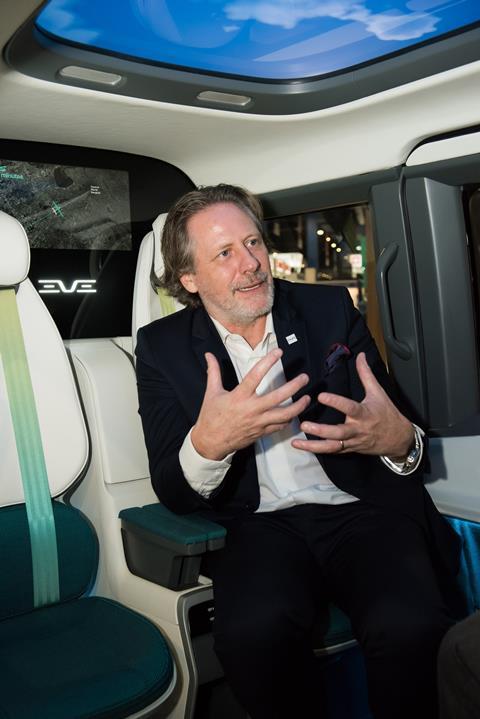Six months after taking over as chief executive of Eve Air Mobility, Johann Bordais is trying to turn some of the start-up’s tentative orders into firm ones.
Melbourne, Florida-based Eve boasts the biggest backlog in the nascent electric vertical take-off and landing (eVTOL) sector, holding more than 2,800 letters of intent (LoIs) for its developmental aircraft.
Such commitments are non-binding, however, and Bordais is keen for that situation to change, he told FlightGlobal at the Singapore air show on 21 February.
“While we’re pushing for firm orders, it’s not for the down payments – that is not part of our business plan,” he says. “It’s more about getting ready. We need to get the infrastructure started, and you need to do it on the basis of a purchase order.”

In an effort to convert some of its LoIs, Embraer-backed Eve has been offering its customers positions among the first 300 production slots at its manufacturing facility in the countryside outside of Sao Jose dos Campos, Brazil. The site is close to Embraer’s massive E-Jet final assembly plant.
Initially, the company plans to produce about 120 aircraft annually, and then to double that rate. Eventually, it hopes to manufacture nearly 500 aircraft each year – that is, “if everything is going very well”, Bordais says.
‘WE KNOW WHAT WORKS’
Following a more than two-decade career with Embraer, Bordais took over as Eve’s CEO in September 2023, replacing former co-chiefs Jerry DeMuro and Andre Stein, who oversaw the company’s public listing on the US stock exchange. He is now tasked with bringing the start-up’s piloted, four-passenger eVTOL to market amid a crowded field of competitors.
Eve is currently assembling its first “proof of concept” prototype, which it plans to fly this year. It will then build five conforming aircraft that will be used for certification flying.
The prototype will be a remotely operated aircraft, serving as a testbed that will allow Eve to evaluate flight and sound characteristics on a full-scale aircraft with a representative configuration of the eventual production eVTOL.
Following the lead of Embraer’s aircraft development programmes, Eve is planning to pursue type certification with Brazil’s civil aviation regulator ANAC, which has a bilateral agreement with the Federal Aviation Administration (FAA). That strategy is intended to allow Eve to avoid the bottleneck of dozens of eVTOL companies that are seeking to certificate their aircraft directly with the FAA.
Bordais says Eve is leaning on Embraer for expertise and experience with pushing new aircraft designs through certification. For example, he points to the fly-by-wire system on the Embraer Legacy 500 business jet as applying directly to Eve’s air taxi design.
“We have been designing and certifying more than 25 aircraft over the last 15 years,” Bordais says. ”We know what works and doesn’t work, and I think this our big advantage.”
’CLOCK IS TICKING’

Eve has about 200 employees on the payroll, but the support of several hundred more through a service agreement with Embraer, Bordais says. That support is critical because there are only so many individuals qualified to help bring a new and novel aircraft to life.
That reality may ultimately factor into consolidation of the air taxi sector in coming months. Any potential acquisitions would be mostly motivated by adding talent, rather than aircraft designs.
“I don’t see how you can really just take over and complete the portfolio or make two products,” Bordais says. ”You can have a good view of the ecosystem and the aircraft you are delivering, but it burns cash. The clock is ticking.”
Bordais believes Eve’s aircraft will be ready for certification by the company’s stated target date of 2026, but acknowledges that is ultimately out of the start-up’s hands.
“It’s a brand new vehicle that we’re putting into the market, and it will take more than internal expertise and the expertise of our partners,” he says. “When we select our suppliers, we look at their expertise and their knowledge of certification, and that makes me really confident in 2026. If it all depends on Eve and our partners, we can do it.”
“The question mark is more the readiness of the ecosystem and certification,” he adds. “We’ve done it so many times; we know that anything can happen.”































